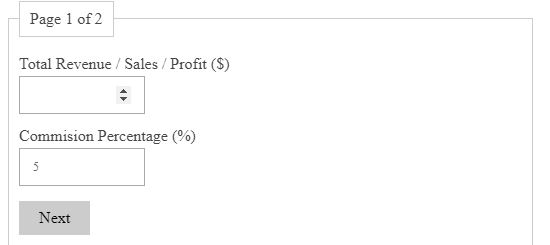Enter your total earned revenue and the percentage of earned revenue that goes to your commission to calculate your total take-home commission.
- ROI Calculator
- Maximum Revenue Calculator
- Real Estate Commission Calculator
- Rental Commission Calculator
Commission Formula
The following formula can be used to calculate a commission.
C = R * CP / 100
- C is the total commission
- CP is the percent commission
- R is the sales number
What is a Commission?
The commission is a payment method widely used in various industries, where an individual or a company receives a certain percentage or fixed amount of money as compensation for their sales or services. This method motivates to drive sales, encourage productivity, and reward individuals or entities for their efforts.
In sales, commission is a vital element as it incentivizes salespeople to excel in their performance. By earning a commission on each sale they make, salespeople are motivated to work harder, seek opportunities, and close deals.
This system promotes healthy competition within sales teams, increasing productivity and better results. Commission creates a direct correlation between effort and reward, ensuring that those who invest more time and effort into their work are duly compensated.
Beyond sales, the commission is also significant in various service-oriented industries. Professionals such as real estate agents, financial advisors, and insurance brokers often rely on commissions to earn a living. Their income is directly tied to the value they deliver to their clients and the deals they successfully close.
The commission serves as an incentive for these professionals to provide quality services and build strong relationships with their clients.
How to calculate commission
The commission is almost always calculated through some percentage of either revenue or profit. For example, you may be earning 10% on all revenue of your sales or accounts. In this case, let’s say you’ve made $200,000.00 dollars in sales over the last year. The commission on that would be:
$200,000.00*(10%/100)= $20,000.00
As you can see, this commission value could quickly rise to unbelievable numbers. To combat that, most companies use something called a cap or maximum commission. In many fields, salesmen will reach their cap then do little work the rest of the year. Although this might seem like a shady thing to do, if you can’t get paid for more work, there’s not much point in it.
Another way companies limit commission is by reducing the percentage you earn as you reach a certain number.
Commission Percentage
Understanding your total take-home pay from the commission is a key aspect in negotiating with your employer. You can’t properly gauge how much you are valued without understanding where most of your pay comes from.
For example, let’s assume you are making $20,000.00 from salary, and $40,000.00 a year from the commission. That means you are receiving only 33% of your total take-home from your salary. Now, this can work out in your favor if there are no caps on your commission, but could also way heavily on you if your sales drop drastically.
It’s important to understand this to make educated decisions on what terms to accept with your employer. It’s typically best to take a middle road between the highest possible earnings and the least possible losses.
What is a commission?
A commission is a monetary reward earned by a salesperson or representative usually through the sale of a good or service that is provided by an employer. In other words, it’s a type of bonus for closing a deal or sale.
Commission Definition
A commission is defined as a percentage of a total sale or flat amount earned by the person making the sale.
